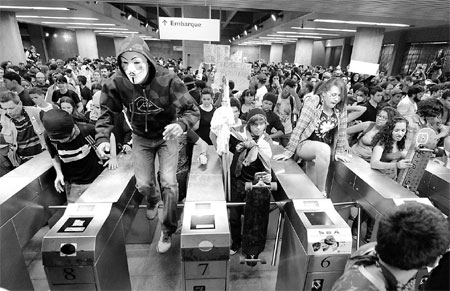Fare rises off, protests continue
|
Students invade a subway station during a protest calling for a public transport free pass in the Federal District, on Wednesday in Brasilia. Evaristo SA / Agence France-Presse |
Rallies in Brazilian cities turn violent over government's lavish spending
Protesters battled police near Rio de Janeiro despite Brazil's two biggest cities scrapping transit fare increases that triggered two weeks of nationwide protests.
The fares decision in Sao Paulo and Rio de Janeiro marked a major victory for the protests - the biggest Brazil has seen in two decades, and which evoked comparisons with the "Arab Spring" and the unrest in Turkey.
The demonstrations were also triggered by anger over the government's lavish spending on the Confederations Cup soccer tournament, next year's World Cup and the 2016 Summer Olympics, which critics say comes at the expense of social programs.
The fares decision, which takes effect on Monday, was not enough to placate all protesters late on Wednesday. Riot police in body armor fired tear gas to break up a mob of several hundred that tried to block a 15-km bridge across Guanabara Bay that links Rio with the city of Niteroi.
The mob, which earlier ransacked a bank branch, knocked over an empty bus, then built barricades with wood debris and set it on fire, an AFP photographer reported.
The violent protesters peeled off from an otherwise peaceful protest march of some 7,000 people in Niteroi. Thousands also marched peacefully in cities including Belo Horizonte, Sao Paulo, and Rio Branco.
However, in the northeastern city of Fortaleza, where Brazil beat Mexico 2-0 in its second Confederations Cup match, some of about 10,000 protesters hurled stones at security forces, who responded with tear gas and rubber bullets.
"Forward, forward," the demonstrators shouted as police blocked access to the $240 million Castelao Stadium.
Several foreign soccer fans were trapped by the protesters. "I'll never come to Brazil again," said Joaquin Diaz, a 42-year-old Mexican who was in town to support his national team.
The protesters, including many young people who feel left behind by Brazil's rapid economic growth, have accused the government of neglecting health and education while pouring millions into sports stadiums.
The government has earmarked $15 billion for the Confederations Cup and the 2014 World Cup, two events aimed at showcasing Brazil's economic boom and rising global stature.
Sao Paulo State Governor Geraldo Alckmin said subway, train and bus fares would revert to $1.35 from $1.44 at the current exchange rate, while Rio Mayor Eduardo Paes said bus fares would go back to $1.24 from $1.33. Several other cities, including Porto Alegre and Recife, had already canceled their fare rises.
The increases may appear modest, but are a major burden for thousands in a country where the minimum monthly wage is $306.
The wave of unrest began nearly two weeks ago in Sao Paulo and rapidly spread as the Confederations Cup kicked off on Saturday.
The justice ministry had ordered a crack federal police unit to deploy in five Confederations Cup host stadiums. In Fortaleza, a city of 3.5 million where 6,000 additional state police troopers were deployed, protesters railed against the country's political class, accusing it of corruption and mismanagement.
(China Daily 06/21/2013 page11)















